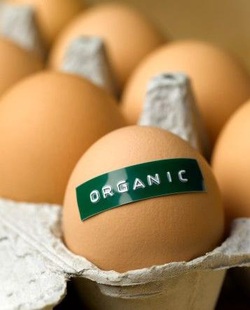
I don't buy a lot of organic food. If I do it's from small farmers in my area and typically they're not even certified organic. I've been deceived too many times to trust the label... most of it is simply marketing anyway. And the thing that just adds to the lie for me is that I find a whole lot more "organic food" is from California... I live in Maryland and we have lots of farms here and in nearby Virginia and Pennsylvania, so I'm a little confused about why they trucked it so far if they really care about the health of people and the environment. Anybody?
I refuse to pay $5 for a gallon of Horizon "organic" milk when they use the exact same feedlot practices as Borden milk producers at $3 per gallon. I care about organics, but I refuse to pay for a lie. The label means nothing to me anymore so I just try to grow as much food as I can at home, support my local small farmers, and buy what I need from the grocery store to fill in all the gaps, carefully checking the ingredients on the package.
Don't missunderstand me... I'm just a regular gal trying to make balanced decisions about the health of my household, the health of the environment, and the health of my pocketbook. I do believe in the Organic Ethos and raise my animals and vegetables without chemicals, such as antibiotics and pesticides, in a humane and environmentally responsible way. I believe that Food Security is as important here in the U.S. as it is in Africa, I care about Fair Trade, I cheerlead for Eating Locally, and support having a Sustainable Table. And, by the way, I also live in the real world; yeah... holy cow. And I need to square it all based on what's right for me. I'm not the Krazy Organic Lady nor am I gonna judge you for your choices. Shoot... I have to make my own choices at the grocery store and some of them might surprise you. But I do want to know what's going on around me, how it affects me, and how my actions impact the planet so that my choices are informed.
Oh yeah... and I want truth in labeling, please. I think some folks don't educate themselves because the truth is scary and their entire propaganda house of cards will fall down. A lot of people never look into the difference between "all natural" and "organic" (a world of difference when you're dealing with large agribusiness) or, for that matter, what "organic" really means to the specific food product they're consuming. They heard on a commercial about just how good company X's product was for them. Well, I do understand the organic ethos and if I'm gonna spend the extra money on the "organic" label I want that label to be true... kind of a reasonable request, don'cha think?
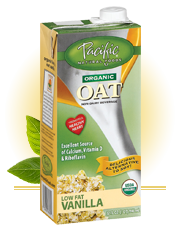
Ok... so the catalyst for my post today is that I saw a few interesting milk alternative products at the store recently. While it's true that I don't need any more kinds of milk (I currently have both whole goat and cow milk in the fridge right now) but I like to look. Something I'd never heard of before was Oatmilk and I was suddenly interested in the wonderful whole oat properties I could add to my diet. I don't do soy milk and find almond milk to be much too sweet for my taste but I wanted to give this Oatmilk a try. The first thing I looked at was the ingredient label and while I was inspecting the high sugar content (19g!), I also saw a prominently displayed logo and annotation indubitably pronouncing every Pacific Natural Food product as guaranteed to be "certified to the source". Interesting... note to self: research this claim.
I tried the Oatmilk and I really enjoyed it... it's tasty stuff. It has only a very subtle grittiness, it's not thick or cloying and it's not much sweeter than regular milk. It's never gonna be mistaken for real milk but that's fine because didn't plan on replacing my real milk. I also liked the packaging: it's minimal, totally opaque, easily collapsable but sturdy enough that I can get at least one or two more use out of it for re-purposing around the farmstead.
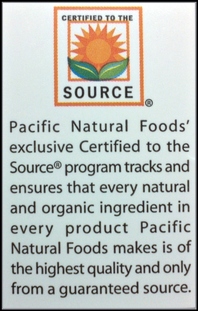
So now I know I like it. It does come all the way from Tualatin, OR tho... hmmmm. Well, this is when I do a little research to find out more about the company and their organic "certified to the source" labeling...
Now I just told you that I don't exclusively buy organic, so why do I care? Because they're making a claim - they're making a promise. I care that there are moms and dads out there who are worried about GMO's and OP's in their kid's food. I'm raising a lot of my own food, not everyone can.
Tsk. Tsk. Tsk. I'm so disappointed in you, Pacific Natural Foods. Cornucopia.org gives you zero beans on their scorecard because you refuse to share your independent sourcing. Why? It means they'll just dig deeper and that's when we all find out that your labeling is just a big fat lie... I might have purchased your products in the future except that now I sort of have a problem with your crappy attitude.
*sigh* China?... Really??
In the words of ol' Kin Hubbard, "Honesty pays, but it don't seem to pay enough to suit some people."
This kinda makes me question Oregon Tilth, they're the Organic Certifier for PNF. The first sentence on their sites certification page claims that Oregon Tilth Certified Organic is a "...symbol of organic integrity. OTCO provides a system that combines strict production standards, on-site inspections, and legally binding contracts to protect the producers and buyers of organic products." I see their name on several organic products at the grocery store so that's got me narrowing my eyes at everything even more than before. Hmmmm... Grandma used to say that when you lay down with dogs you get up with fleas.
Well, I'll get off my soapbox for now. As a parting gift to the folks who made it through this entire post, I offer the Conupocia Institutes' most recent newsletter. I believe that as long as you stay educated you can make informed choices - whatever they may be._
.
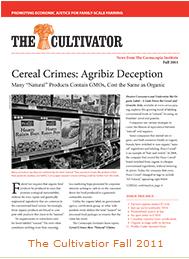
This Newsletter from the Cornucopia Institute, a Wisconsin based Organic watchdog group, will empower consumers and wholesale buyers who want to invest their food dollars to protect hard-working family farmers.
Federal law requires that organic food products be produced in ways that promote ecological sustainability, without the toxic inputs and genetically engineered ingredients that are common in the conventional food system. Increasingly, these organic products are forced to compete with products that claim to be “natural.”
No requirements or restrictions exist for foods labeled “natural.” The term often constitutes nothing more than meaningless marketing hype promoted by corporate interests seeking to cash in on the consumer desire for food produced in a genuinely sustainable manner.
Unlike the organic label, no government agency, certification group, or other independent entity defines the term “natural” on processed food packages or ensures that the claim has merit.
The Cornucopia Institute’s latest report, Cereal Crimes: A Look Down the Cereal and Granola Aisle How “Natural” Claims Deceive Consumers and Undermine the Organic Label explores this growing trend of labeling conventional foods as “natural,” focusing on breakfast cereal and granola. (Watch the video)
Companies use various strategies to create the illusion of equivalence... Read More
.

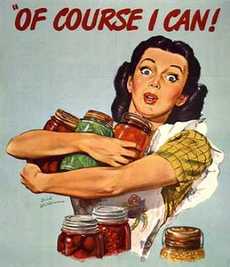

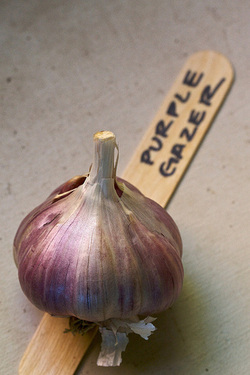
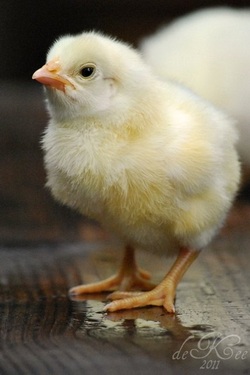
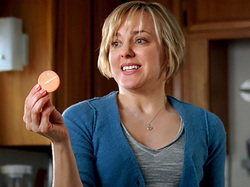

 RSS Feed
RSS Feed



